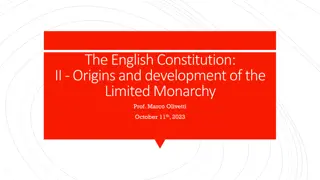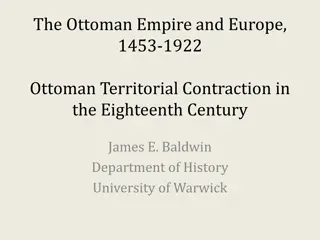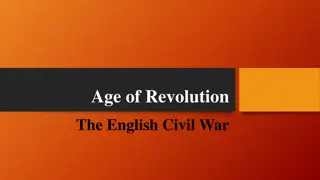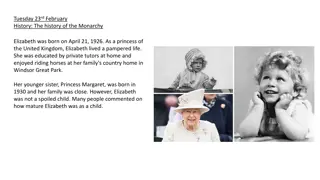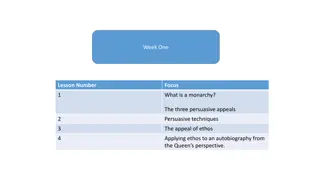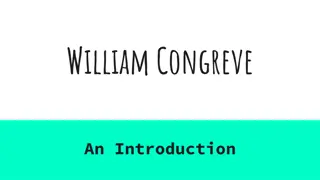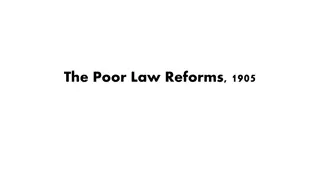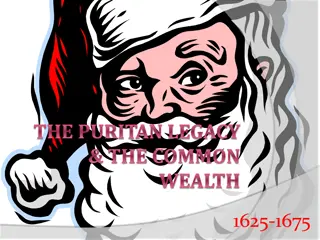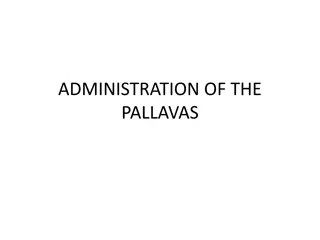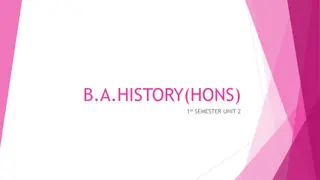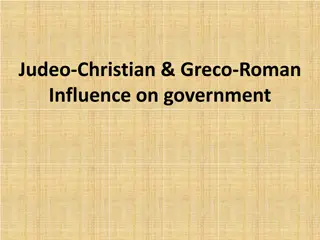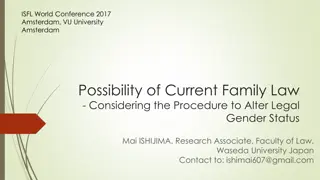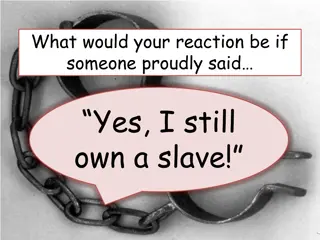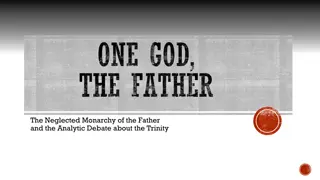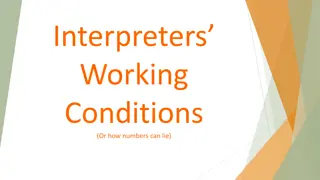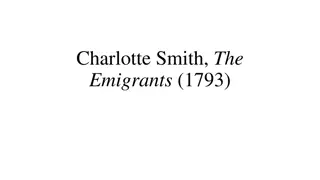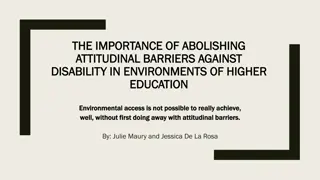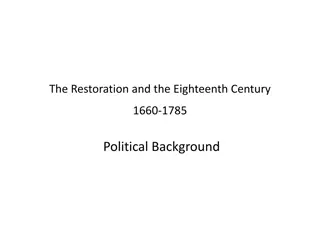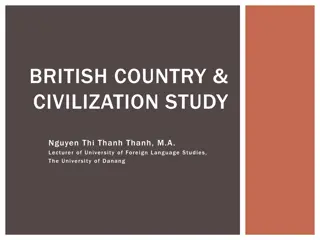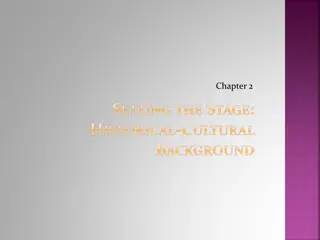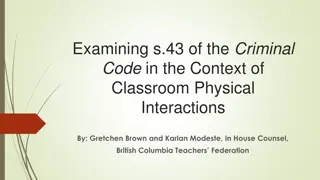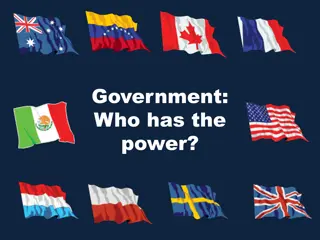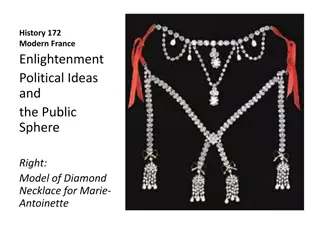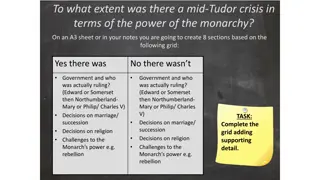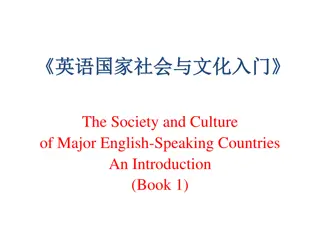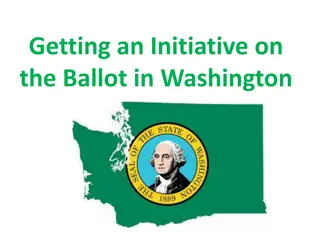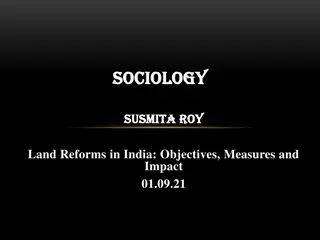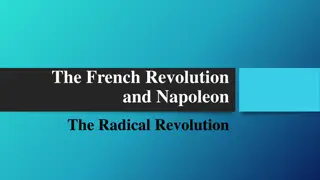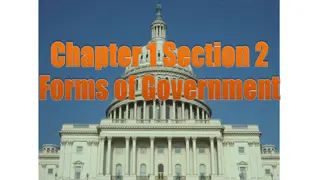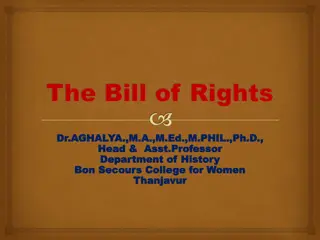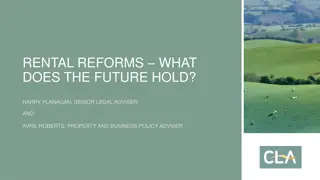Cromwell in Ireland
English authority in Ireland faced challenges after the rebellion of 1641. Cromwell was appointed to crush unrest, landing near Dublin with 12,000 men. Concerns of Parliament included the threat of Catholicism and the use of Ireland against the monarchy. Criticisms arose over Cromwell's brutal campa
0 views • 13 slides
Evolution of Limited Monarchy in English Constitution
The development of limited monarchy in the English Constitution is traced from Anglo-Saxon Britain through the introduction of feudalism. This system of governance established a complex relationship between the king, lords, and vassals, leading to the formation of the King's Council and the origins
0 views • 19 slides
Ottoman Empire Territorial Contraction in the 18th Century
Ottoman Empire faced agricultural and fiscal crises in the 17th century, leading to internal rebellions. However, by the mid-17th century, the empire had recovered and experienced further expansion, albeit at a slower rate compared to the previous century. In the 18th century, the Ottomans suffered
2 views • 12 slides
The English Civil War and the Rise of the Stuart Dynasty
The English Civil War marked the end of the Tudor dynasty and the rise of the Stuart Dynasty in England. It was a time of conflict between the monarchy and Parliament, with issues revolving around divine right, religion, and political power. Leaders like James I and Charles I faced opposition from P
0 views • 13 slides
The Fascinating History of Queen Elizabeth II and the British Monarchy
Princess Elizabeth's journey from a pampered princess to a mature and resilient queen, overcoming challenges during World War II and ultimately becoming the longest-reigning British monarch in history, with significant events like her marriage to Prince Philip and her coronation in 1953 highlighted.
2 views • 5 slides
Understanding Monarchy: A Study in Persuasive Appeals
Introduction to the concept of monarchy as a form of government and its various manifestations, exploring persuasive appeals and the application of ethos through the perspective of a queen. The content delves into the role of a monarchy in modern society and encourages critical analysis through tran
10 views • 18 slides
The Influence of William Congreve on Restoration Comedy
William Congreve, an English playwright and poet of the Restoration period, is known for his clever and satirical dialogue that influenced the comedy of manners style. The Restoration period marked the end of Cromwell's Commonwealth and the return of monarchy with Charles II. Comedy of manners refle
0 views • 10 slides
The Poor Law Reforms of 1905: Addressing Unemployment in England
At the turn of the 20th century, England's working class, especially in mining regions, faced unemployment due to industry challenges. The Liberal party promised and initiated reforms, including replacing poor law unions, abolishing punitive relief, and introducing public assistance programs and soc
0 views • 16 slides
The Puritan Legacy & The Commonwealth 1625-1675: A Historical Overview
The era between 1625-1675 is known as The Puritan Legacy & The Commonwealth, characterized by a Puritan movement seeking moral and political reform. This period saw conflict, the rise of Puritan standards, beheading of Charles I, and the establishment of the Commonwealth under Cromwell. The Puritans
2 views • 21 slides
Administration of the Pallavas: Organized Governance in Ancient Tamil Country
The Pallava kings established a well-organized administration in the Tamil Country, mirroring the Mauryan system. Administrative units like Mandalam, Kottam, Nadu, and Ur were pivotal in governing the vast Pallava Empire. The monarchy was led by the king, who claimed divine origin, with efficient Co
0 views • 8 slides
Rise of Janapadas and Mahajanapadas in Vedic India
The rise of Janapadas and Mahajanapadas marked a significant transition in the political landscape of Vedic India. Janapadas, major kingdoms of that era, evolved into more powerful Mahajanapadas through territorial expansion and urbanization. The shift from tribal polities to territorial states led
0 views • 9 slides
Influences and Views on Government: Judeo-Christian and Greco-Roman Perspectives
Explore the influences of Judeo-Christian and Greco-Roman traditions on government systems, including forms of government such as monarchy, democracy, and republic, along with views on citizen participation, natural laws, and legal principles. Delve into how concepts from Ancient Greece and Rome sha
0 views • 24 slides
Possibility of Current Family Law in Addressing Legal Gender Status Changes
This presentation by Mai Ishijima explores the potential interim solutions that current family law could offer for newly-recognized parent-child relationships, particularly in abolishing requirements like physical modifications and sterilization in legal gender status alteration processes. It delves
0 views • 12 slides
The Journey to Abolishing Slavery: Understanding William Wilberforce & the Movement
Discover the historical context of slavery, the pivotal role of William Wilberforce, and the reasons behind Britain's decision to abolish the slave trade in 1807. Explore key events, debates, and societal shifts that led to the abolition movement, shedding light on the complexities and motivations i
0 views • 9 slides
Analyzing the Neglected Monarchy of the Father in Trinitarian Debate
Exploring the Monarchy of the Father doctrine and its implications on the Trinitarian debate, this analysis delves into historical context, objections, and influential alternatives like Biblical Unitarianism, shedding light on how reevaluating traditional definitions can reshape theological discussi
0 views • 67 slides
Understanding Customer Experiences and Expectations in Retail Environment
Exploring the perspective of customers in the retail sector, this content delves into their past experiences and future expectations. It covers various aspects such as service delivery, pricing challenges, issues with product imports, and customer expectations regarding policy revisions and customer
3 views • 8 slides
Improving Interpreters' Working Conditions Through Strategic Changes
Recognizing discrepancies in workload distribution among interpreters, the need for a more efficient system was acknowledged. By abolishing interpretation slots and implementing new working conditions, productivity gains were evident, primarily from other efficiency measures. The new system aimed to
2 views • 36 slides
The Emigrants (1793) - Historical Context and Events
Set during the turbulent times of the French Revolution, "The Emigrants" by Charlotte Smith captures the political upheaval and societal changes in France during 1792 and 1793. The story unfolds against a backdrop of revolutionary events such as the execution of Louis XVI, France's declaration of wa
1 views • 23 slides
Overcoming Attitudinal Barriers for Students with Disabilities in Higher Education
Achieving environmental access in higher education environments for students with disabilities requires abolishing attitudinal barriers first. Positive faculty attitudes have been shown to enhance academic success for these students, combating stigma and societal disadvantages associated with disabi
1 views • 13 slides
Understanding the British Governmental System and Monarchy
Explore the British governmental system and monarchy with insights into the House of Parliament, House of Lords, House of Commons, Buckingham Palace, and the Royal Flag. Discover the roles and functions of key institutions in the UK's political framework.
0 views • 13 slides
England in the Restoration and Eighteenth Century: Political Evolution and Social Transition
Following years of civil wars and revolution, England saw significant political shifts from the Restoration period in the 1660s to the Eighteenth Century. The monarchy was restored, leading to the emergence of Whig and Tory political factions, battles for religious dominance, and the growth of Briti
2 views • 14 slides
British Country & Civilization Study: Government and Constitution Overview
The British Country & Civilization Study covers various aspects of the United Kingdom, including its government structure, constitution, history, education, and holidays. The UK is a parliamentary democracy with a constitutional monarchy, where the relationship between the State and the people relie
1 views • 41 slides
Historical and Cultural Context in Biblical Hermeneutics
Understanding the historical and cultural background is vital for interpreting biblical texts accurately. This includes exploring the relationship between history and literature, studying chronology, patriarchal periods, and significant events like the Exodus and United Monarchy. By delving into the
0 views • 48 slides
Examining Section 43 of the Criminal Code: The Debate on Corporal Punishment in Schools
Section 43 of the Criminal Code, known as the "Spanking Law," justifies the use of force for correction by teachers, parents, or guardians towards children under their care. This provision has historical roots and has sparked debates on corporal punishment in schools globally. The article explores t
2 views • 43 slides
Understanding Different Forms of Government
An institution known as government establishes and enforces rules for a group of people. This institution must possess sovereignty, legitimacy, and jurisdiction. Various forms of government exist, such as dictatorship, absolute monarchy, and constitutional monarchy, each with distinct characteristic
0 views • 12 slides
Enlightenment Political Ideas in Modern France
The Enlightenment era in Modern France brought forth significant political ideas and discussions, including Thomas Hobbes' concept of social contract and Rousseau's emphasis on collective sovereignty. Montesquieu advocated for checks-and-balances in government, while Voltaire promoted enlightened ab
0 views • 21 slides
Australia - Overview of Geography, Government, and Environmental Challenges
Australia, officially known as the Commonwealth of Australia, is a federal parliamentary state with a constitutional monarchy. The country has a unique landscape, facing challenges such as water management due to its dry climate. Climate change impacts are also a significant concern, making Australi
0 views • 24 slides
Examination of the Mid-Tudor Crisis: Power Struggles and Challenges to Monarchy
The mid-Tudor era witnessed a crisis in the power of the monarchy, as evident through issues of government authority, decisions on marriage and succession, religious policy, and challenges to royal power. The complexities of ruling under Edward VI, Mary I, and their advisors, along with crucial even
0 views • 16 slides
Understanding Thomas Hobbes' Leviathan: State of Nature, Natural Laws, and Commonwealth
Thomas Hobbes explores the state of nature, natural laws, and the formation of the commonwealth in his work Leviathan. He discusses the equality of men, causes of conflict in the state of nature, and the transition out of this chaotic state towards civil society under a monarchy. According to Hobbes
0 views • 15 slides
Rise of Mussolini in Italy and Weaknesses of the Liberal Monarchy
The historical timeline of Italy before 1919 led to Mussolini's rise to power through various events such as his involvement with the Italian Socialist Party and the formation of the Fascio di Combattimento. Italy's Liberal Monarchy faced weaknesses, including political divisions between progressive
0 views • 35 slides
The Government and Monarchy of the United Kingdom: A Historical Overview
Explore the rich history of the United Kingdom's government and monarchy, from the ancient institution of the Monarchy and the role of the Prime Minister to significant events like Magna Carta and the Civil War. Discover the development of Parliament, the birth of the Prime Minister, the roles of th
0 views • 28 slides
Initiatives Process in Washington State
Discover how to get an initiative on the ballot in Washington State, including creating a petition, gaining voter signatures, and the legislative process involved. Explore past and current initiatives, like those on elected officials' salaries, state income tax, and abolishing the death penalty. Get
0 views • 6 slides
Land Reforms in India: Objectives, Measures, and Impact
Land reform in India refers to institutional measures aimed at changing the ownership, tenancy, and management of land to improve agro-economic institutions. The objectives include achieving an egalitarian agrarian structure, eliminating exploitation, improving conditions for rural poor, and increas
0 views • 16 slides
The Radical Phase of the French Revolution: Abolishing the Monarchy
The French Revolution entered its Radical Phase in 1793, marked by violent events such as the abolition of the monarchy, execution of King Louis XVI, establishment of the French Republic, and the subsequent Reign of Terror. Tensions rose as war broke out with various countries, leading to internal c
0 views • 19 slides
Overview of Different Types of Governments and Their Classifications
Governments vary in structure and features, with classifications based on key characteristics like the concentration of power, participation in governance, and the relationship between branches. This overview covers various government types such as autocracy, democracy, oligarchy, and monarchy, high
0 views • 15 slides
The English Bill of Rights: Definition and Impact
The 1689 English Bill of Rights was a pivotal British law passed after the Glorious Revolution of 1688. It outlined the rights and liberties of people, limiting the monarchy's power and establishing a constitutional monarchy in Great Britain. The Bill influenced constitutional developments in North
0 views • 10 slides
Future of Rental Reforms: A Comprehensive Overview
The future of rental reforms holds promises of a fairer Private Rented Sector, aiming at quality, affordability, and fairness. Key initiatives include introducing a Property Portal, abolishing Section 21 no-fault evictions, and strengthening enforcement powers. The focus is on meeting the Decent Hom
0 views • 11 slides
Political Evolution of Nepal: From Monarchy to Republic
Explore the political history of Nepal from the days of monarchy to the establishment of a republic. Learn about the key players, structures, and societal makeup that have shaped the country's journey towards democracy and governance.
0 views • 11 slides
The Monarchy in England: From Restoration to Revolution
The content discusses the Restoration of the monarchy in England, the reign of Charles II, the formation of political parties Whigs and Tories, the rise of the Whigs, James II's absolutist aims, and the Glorious Revolution leading to the Bill of Rights in 1689 limiting the monarch's power.
0 views • 8 slides
Understanding Different Forms of Government
Exploring various types of government, from monarchy to democracy, and discussing the roles and structures that define each system. Discover insights into absolute monarchy, constitutional monarchy, and more, shedding light on the diverse ways societies are governed.
0 views • 20 slides

